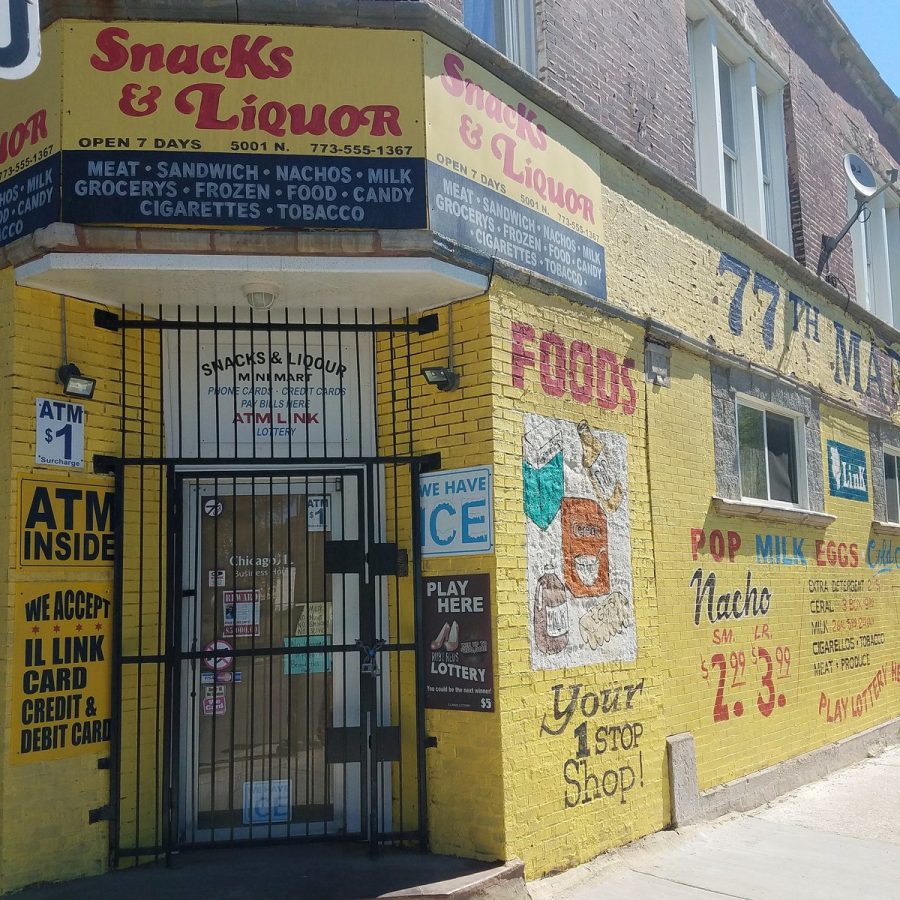Food deserts still plague South Side neighborhoods
Showtime’s “The Chi” created this convenience store for a set, then threw away all the food used as props in North Lawndale—one of Chicago’s worst food deserts.
October 30, 2017
When Showtime’s “The Chi” wrapped filming at a convenience store set in North Lawndale, a dumpster’s worth of food and household supplies was left behind, shining a spotlight on the neighborhood’s status as a food desert.
The food and supplies used to decorate the set at 19th Street and Kedzie Avenue were thrown out rather than donated to one of the 15 pantries in the area.
North Lawndale is one of 22 Chicago communities that does not have large grocery stores or supermarkets—qualifying it as a food desert—according to a July 2012 report by the Virginia Commonwealth University Center on Human Needs.
State Rep. Sonya Harper, D-Chicago, has lived in West Englewood her entire life, a South Side community that does not have grocery stores within walking distance in the neighborhood.
“Experiencing people in my family dying from preventable, diet-related diseases at a very early age prompted me to want to study [food deserts],” Harper said.
House Bill 3157, introduced by Harper Feb. 9 and signed by Gov. Bruce Rauner Sept. 8, requires the state Department of Agriculture to analyze Illinois’ food deserts and the health impacts they cause within those communities.
“Every year, members of the General Assembly will now get a report detailing locations in the state that are food deserts,” Harper said, “so that we can take proactive steps to remedy those areas [so] people aren’t left out because they live in a neighborhood where retailers may not want to go.”
ZIP codes, not genetic codes, are the most impactful life expectancy predictor, said Dr. Terry Mason, Cook County Department of Public Health chief operating officer. Mason is among others in Chicago working to examine and eliminate food deserts in the city and its suburbs.
According to the VCU study, Chicago residents in communities with no supermarkets are 25–46 percent less likely to have a healthy diet compared to communities with the greatest access to stores.
Mason said a lack of access to grocery stores contributes to health issues such as high blood pressure, diabetes and obesity. Lack of access to nutritious food means citizens have to replace home-cooked meals with fast food meals, he added.
“When you have a generation of people whose bodies won’t operate or have diseases at an early age, think about what burden that may place on the generation behind them,” Harper said
Mason explained that communities become food deserts because grocery stores and other businesses abandon the neighborhoods as economic opportunity leaves and access to basic resources follows.
“We have to invest in communities and not desert them, and we need do that early on before they become deserts,” he said.
Whole Foods opened a new location in Englewood in September 2016 and received about $10.7 million in various city subsidies from Mayor Rahm Emanuel’s efforts. The store was deserved and serves as an improvement to the food desert, but residents need options with more affordability, Harper said.
“What do we need next?” She asked. “I’m interested to know [if] there are plans to bring [more stores] or are we just going to keep plopping Whole Foods where poor people live in food deserts?”
Malik Nevels, a member of the Illinois Advisory Committee to the U.S. Commission on Civil Rights, worked on a 2011 Chicago food deserts study. Nevels said since the report was released, there has been incremental change in the city.
He commended Whole Foods for taking a risk and opening a store in Englewood, noting it is the business community’s responsibility, as well as the city’s, to help the food desert crisis.
“When this city wants to do something, it does it,” Nevels said. “If [the city] devoted the same level of commitment to the food desert issue as they did to getting Amazon to land its headquarters here, we wouldn’t have any problem.”








